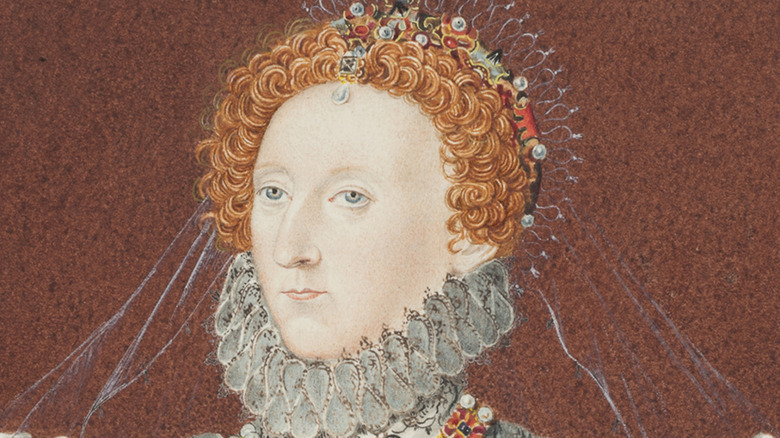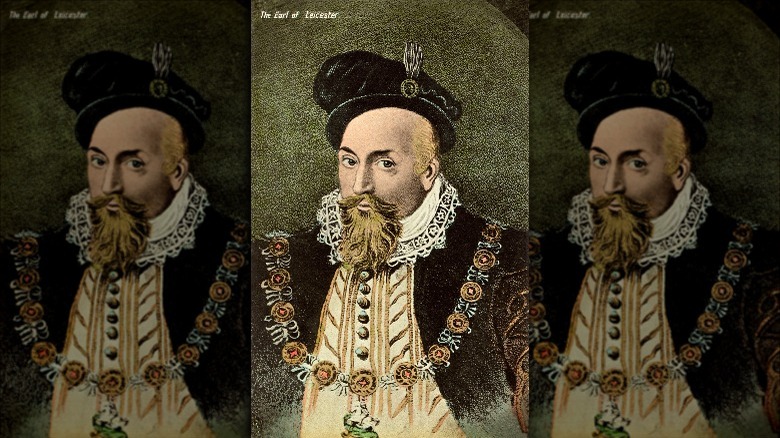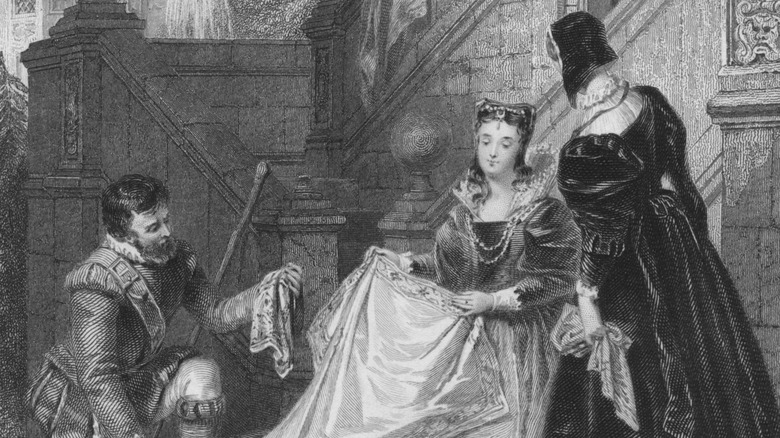The Mystery Surrounding Queen Elizabeth I's Rumored Love Triangle
She was called the Virgin Queen and in her lifetime created the image of herself as a monarch who eschewed romantic love in favor of giving her attention to the task of ruling England and Ireland — which at the time was at war with Spain — with utmost competence and grace. But according to Biography, the life of Queen Elizabeth I (1533-1603) may not have been quite as virginal as her subjects might have imagined.
As Queen of a powerful nation, Elizabeth I attracted aristocratic suitors from all over Europe, particularly in the early years of her reign. As noted by History Hit, such potential unions were crucial in helping to sow the seeds of alliances between otherwise feuding nations, and King Eric XIV of Sweden, Archduke Charles of Austria, and even King Philip II of Spain — who would later become Elizabeth's enemy in war — each attempted to secure Elizabeth's hand in marriage.
The Queen entertained such advances, though according to Biography much of this was to do with forging diplomatic ties with her suitors' nations; in truth, Elizabeth was skeptical of marriage due to the bad experiences of her close relatives. However, according to historians, there was one man with whom Elizabeth was said to be deeply enamored: Robert Dudley, Earl of Leicester.
Was Elizabeth I in love with a courtier?
Robert Dudley was the son of the Duke of Northumberland who had been executed for his role in the campaign to make Lady Jane Grey the next queen following the early death of Edward VI. According to History Extra, young Robert was also involved in the campaign and found himself imprisoned in the Tower of London by the conflict's victor, Queen Mary I.
Also in the Tower was the future Elizabeth I, imprisoned by her paranoid half-sister who was afraid that Elizabeth might similarly make a grasp for power. Their imprisonment was just one of many commonalities that would ensure that Elizabeth and Dudley would establish an early friendship that would grow more intense and intimate when Elizabeth herself came to power.
Per the same source, upon her accession, the Queen installed Dudley as her "Master of the Horse," a close position that would ensure her and her new "favorite" were never far from each other. The relationship, however, caused a major scandal: Dudley himself was already married, and a sexual relationship with one of her own courtiers risked reducing the Tudor court to factionalism. Nevertheless, rumors persisted, and Elizabeth did nothing to quell them by installing Dudley's sleeping quarters in close proximity to her own.
The unexplained death of Elizabeth I's love rival
According to Britannica, Robert Dudley's first wife, Amy died in 1560, just two years after Queen Elizabeth I took the throne. The official story was that she had fallen down the stairs and that her death was a tragic accident. However, rumors soon circulated that there was more to Amy's downfall than met the eye.
The Daily Telegraph notes that while the death of Amy meant that Dudley was now free to marry Elizabeth, whisperings that she had actually been murdered by her husband — potentially at the Queen's behest — squandered any chance of a union between them. For 18 years, Dudley remained an unmarried widower. Though History Extra notes that Dudley would have been aware of Elizabeth's vow that she would "never marry" following the execution of her stepmother, Catherine Howard, at the hands of her father, Henry VIII, in 1541, some historians believe Dudley was keeping himself available in case his supposed lover had a change of heart. Britannica claims that Dudley eventually became an "active suitor" of the Queen, but to no avail.
He eventually remarried in 1578, taking as his wife Lettice Knollys, one of the Queen's ladies-in-waiting whom he had secretly impregnated after a lengthy affair, according to History Extra. Elizabeth hated Knollys with a passion for her relationship with Dudley, and she was banished from the court.


